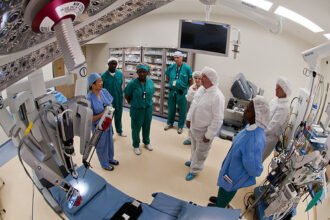 For many years, authors and movie studios have imagined a world where humans are replaced by mechanized overlords–think Terminator and Matrix. In medicine, as technology continues to evolve, computers and other diagnostic aids are readily available. Many offices and hospitals utilize tablet computers, iPads and other fancy tools when managing patients.
For many years, authors and movie studios have imagined a world where humans are replaced by mechanized overlords–think Terminator and Matrix. In medicine, as technology continues to evolve, computers and other diagnostic aids are readily available. Many offices and hospitals utilize tablet computers, iPads and other fancy tools when managing patients. Although the practice of medicine is closely coupled to complex technology and computers, it is at its roots a very personal and intimate interaction between two or more human beings. However, computers such as IBM’s Watson are now able to solve complex problems and synthesize data to provide medical diagnoses from inputted data. It is only natural that some scientists (and businessmen) want to replace doctors with machines. This week in the New York Times, author Kate Hafner explores this very issue.
As a medical student at Wake Forest University, a resident at the University of Virginia and then as a Fellow at Duke University, I can remember going to case conferences and marveling at the diagnostic skills of senior faculty. Often, an unknown case would be presented to the institution’s best medical diagnostician by the Chief Residents. These medical “superstars” would have absolutely no preparation and would have only the hour of the conference to come up with a diagnosis. History, physical exam and routine laboratory data would be provided in a case presentation. The “superstar” would then be allowed to ask questions and order tests. If the test result was actually performed on the case the result would be provided.
At the end of the hour, the diagnostic superstar would mesmerize the crowd with a summary of the findings, describe his thought process and provide his top three diagnoses. Without fail, he would then provide the correct diagnosis AND his reason for his decision. A hush would fall over the auditorium and the Chief Resident would announce that once again, Dr Superstar had made the right diagnosis. As physicians in training, we would leave INSPIRED to become better doctors.
Computers are able to process incredible amounts of information quite quickly. In the New York Times article, the author explores the value of intuition and gut instinct–certainly computers are able to process vast amounts of information very quickly and come up with viable diagnostic options. Humans are quite adept at recognizing patterns. Pattern recognition is essential to making accurate diagnoses. As Ms. Hafner mentions in her article, the “superstar” diagnosticians must combine a good fund of knowledge with logic, pattern recognition and intuition. No computer is able to combine all of these factors. However, when a physician does this type of diagnostic work, it is done at human speed. Computers can quickly crunch numbers and work through pre-defined algorithms and provide a list of diagnostic possibilities in an instant. Computers require programmers. Doctors require medical school, residency, fellowship and most importantly EXPERIENCE.
Physicians are essential to the practice of medicine. Computers and computer algorithms can help to manage and catalog vast amounts of medical information. Neither a physician nor a computer can practice medicine alone in a vacuum today. As medical science continues to rapidly develop computers are very useful resources. Creating algorithms for problems solving and diagnosis is important–not as a Dr Superstar replacement BUT as an adjunct to diagnosis. By its very nature, medicine is all about human contact and human interaction.
There are many subtleties to complex diagnosis that can only be picked up on by TALKING to and EXAMINING the patient. As we move forward with healthcare reform and begin to make tough decisions about cost effectiveness and efficiency of care, we must keep in mind the importance of clinical diagnosis by a PHYSICIAN. The practice of medicine is certainly a science but it also remains an ART. Just ask Dr Superstar, in an hour, he will amaze you with the right answer…every single time.






